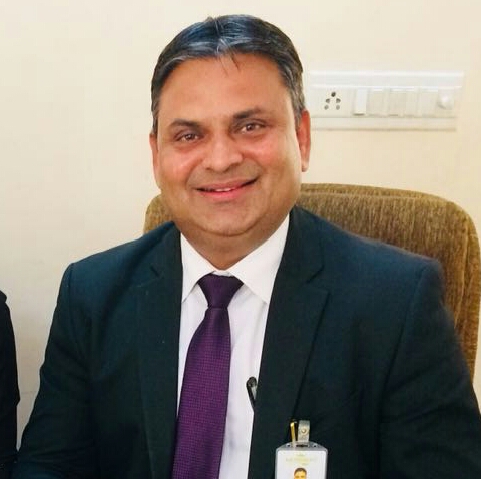This user agreement is an electronic record in terms of Information Technology Act, 2000 ("Act") and rules there under as applicable and the amended provisions pertaining to electronic records in various statutes as amended by the Information Technology (Amendment) Act, 2008. This user agreement is generated by a computer system and does not require any physical or digital signatures.
"User" refers to you, the person visiting, accessing and/or using the Service by means of any communication device.
"Taxmaxindia.com" refers to Pride 24x7 Services proprietory firm( Propertier Sandeep Khandelwal) and having its registered office address at 1-2, 1st Floor of Patel Cloth Store, Heera Nagar Corner,Near Bank of Baroda, Ajmer Road, Jaipur (Raj.) India, which is the owner of all rights in this Service.
All references to "You" and "Your" shall mean the User. All references to "Taxmaxindia", "Company", "We", "Us" and "Our" shall mean Pride 24x7 Services proprietory firm( Propertier Sandeep Khandelwal).
This is a legal and binding agreement between You i.e. the User of the Service and the Company and states the terms that govern Your use of the Service. By accessing this Service, You consent, agree and undertake to abide, be bound by and adhere to the Terms of Use and if You do not agree to these terms of use, You should not access or use the Service and any use thereafter shall be unauthorized.
By accessing and/or using the Service, You signify Your agreement to accept these binding Terms of Use herein. This document constitutes a legally binding user agreement between the Company and You. IF YOU DO NOT AGREE WITH ANY OR ALL OF THE FOLLOWING TERMS AND CONDITIONS OF USE (INCLUDING THE PRIVACY POLICY), PLEASE DO NOT ACCESS AND/OR USE THE SERVICE.
The Company retains the right at any time to deny or suspend access to all or part of the Service to anyone who the Company believes has violated any of these Terms of Use.
USER ELIGIBILITY
Use of the Website is available only to persons who can form legally binding contracts under Indian Contract Act, 1872. Persons who are “incompetent to contract” within the meaning of the Indian Contract Act,1872 including minors, un-discharged insolvent etc. are eligible to the Website. If you are a minor i.e. under the age of 18 years, you shall not register as a User of the Website and shall not use the Website.
YOUR ACCOUNT AND USES OBLIGATIONS
Your Account and uses obligations if you use the website you shall be responsible for maintaining the confidentiality of your login ID and Password and You shall be responsible for all activities that occur under your login ID and Password. all the information provided and uploaded by you should be true accurate and non false You agree that if you provide any information that is untrue inaccurate incomplete or not in accordance with this terms of uses we shall have the right to indefinitely suspend or terminate or block access of your ID on the website and refuse to provide You with access to the Website
USE OF THE WEBSITE
By accessing the Website, you warrant and represent to the website owner that you are legally entitled to do so and to make use of information made available via the website.
TRADEMARK
The trademarks, names, logos and service marks (collectively “Trademarks”) displayed on this website are registered and unregistered trademarks of the website owner. Nothing contained on this website should be construed as granting any license or right to use any trademark without the prior written permission of the website owner.
EXTERNAL LINKS
External links may be provided for your convenience, but they are beyond the control of the website owner and no representation is made as to their content. Use or reliance on any external links and the content thereon provided is at your own risk.
AUTHENCITY OF DOCUMENT
You shall not to upload post , transmit, update or share any information which:-
1) Belongs to another person and to which You do not have any right;
2) Is misleading in any way;
3) Contains photographs or documents of another person;
4) Infringes any patent, trademark, copyright or other proprietary rights or third party’s trade secrets or rights of publicity or privacy;
5) Violates any law for the time being in force;
6) False, inaccurate or misleading;
WARRANTIES
All Services included or otherwise made available to you whom this Website are provided on as is and as available without any representation or warranties express or implied accept otherwise specified in writing without prejudice to the following paragraph company does not warrant that this website will be constantly available or available at all information on this website is complete accurate and true.
The Website owner makes no warranties, representations, statements or guarantees (whether express, implied in law or residual) regarding the website.
CONTESTS AND PROMOTIONS
Any and all contests, promotions, surveys and campaigns hosted or conducted on the Service are subject to separate contest terms and conditions.
DISCLAIMER AND LIMITATION OF LIABILITY
:
We are not responsible or liable for any infection or contamination of your system or device arising out of or in connection with your use of the service or any connected service and do not warrant that the service, the server(s) that make the service available or any connected services are free from virus, worms, or similar items.;
We are not responsible or liable for interruptions, delays, inaccuracies, errors, or omissions arising for services due to change in govt. policies, maintenance of the website or any other reason which is beyond our control liability is limited to the maximum services charges paid by you for product services.
.
We will keep our best efforts for providing the services. However, the company takes no responsibility for, and will not be liable for, the service being unavailable due to any reasons.
.
The service may contain links to other third-party websites/services which are not under the control of the company. Any website you visit by a link from the service is solely the responsibility of the third party providing the website. The content of, including materials and information contained on, any third party website to which you link from the service is solely the responsibility of the provider of that third party website.
The company, associates, key managerial personnel, employees, officers, shareholders, agents, representatives, consultants and third-party service providers shall not be liable for any loss and/or damage and/or claims of any kind (whether in contract, tort or breach of statutory duty or otherwise) arising out of or in connection with the service without limitation:
Indirect or consequential loss, loss of profits or revenue or savings or other economic loss, incidental, direct, or special loss or similar damages, loss of business, reputation or goodwill; and/or
INDEMNITY
Its affiliates, associates and group companies, and their respective directors, key managerial personnel, employees, officers, shareholders, agents, representatives, sub-contractors, consultants and third-party providers from and against all losses, claims and damages including legal fees, resulting from:
(i) Your violation of any term of these terms of use;
(ii) Your violation of any third party right, including without limitation any publicity, privacy, or intellectual property right;
(iii) Your breach of any applicable laws;
(iv) Any unauthorized, improper, illegal or wrongful use of your account by any person, including a third party, whether or not authorized or permitted by you; and
(v) Your breach of any representation, warranty, covenant or undertaking under these terms of use or under applicable law. This indemnification obligation will survive the expiry or termination of these terms of use and your use of the service.
THIRD PARTY WEBSITES
1. This Service may contain links to other websites owned and operated by third parties who are not related to the Company ("Third-Party Websites"). Third-Party Websites are not under the control of the Company and the Company shall not be responsible for the content of any Third-Party Websites or any hyperlink contained in a Third-Party Websites and makes no representation or warranty with respect to the content of any such Third-Party Websites.
2. Your access and usage of any Third-Party Websites is entirely at Your own risk. The Company shall not be a party to any transaction between You and a Third-Party Website. Your use of a Third-Party Website is subject to the terms and conditions of that Third-Party Websites in addition to these Terms of Use. If there is any inconsistency these Terms of Use shall prevail.
3. The Service may contain third party advertisements, promotions, etc. The display of such advertising does not in any way imply an endorsement or recommendation by the Company of the relevant advertiser, its products or services or any such Third-Party Website. You must refer directly to the relevant advertiser for all information regarding the advertiser and its products and/or services. The Company accepts no responsibility for any interaction between You and the relevant third party and is released from any liability arising out of or in any way connected with such interaction and/or any defects, deficiencies, claims, etc. arising out of an advertiser’s products and/or services.
DISPUTES
Any dispute relating in any way to your visit to this site shall be submitted to the exclusive jurisdication of the court at Jaipur, (Rajasthan), india.
SUPPORT
If You have any questions or queries with respect to the Service, then such correspondence should be directed
TERMINATION
The Company reserves the right to terminate Your access to all or part of the Service, at its sole discretion, without notice and without liability either to the Company or its directors, key managerial personnel, officers, employees, either for convenience or for any reason, including in the event of suspected or actual breach by You of any of these Terms of Use, the Privacy Policy, violation of any law including the Act and/or rules thereunder or any other regulation, or for any other reason that the Company deems fit.
MISCELLANEOUS
1. The fastest and easiest way to notify the Company of any grievance is by sending an email notification to Our grievance officer
2. These Terms of Use contain the entire understanding between You and the Company and supersedes all prior understanding between the User and the Company in respect of the User's access and/or use of the Service.
3. If any provision of these Terms of Use is found to be illegal, invalid or unenforceable, then to the extent to which such provision is illegal, invalid or otherwise unenforceable, it shall be severed and deleted and the remaining provisions shall survive and remain in full force and effect and continue to be binding and enforceable.
4. Any express waiver or failure to exercise promptly any right under these Terms of Use will not create a continuing waiver or any expectation of non-enforcement.
5. You agree that the Company shall be under no liability whatsoever to You in the event of non-availability of the Service or any portion thereof occasioned by Act of God, war, disease, revolution, riot, civil commotion, strike, lockout, flood, fire, satellite failure, network failures, server failures, failure of any public utility, terrorist attack, network maintenance, Service maintenance, server maintenance, or any other cause whatsoever beyond the control of the Company.
6. These Terms of Use shall be governed by and construed in accordance with the laws of the India and be subject to the exclusive jurisdiction of the Courts at Jaipur, without giving effect to any principles of conflicts of law.
7. This website is for information purposes only. It is not a substitute for, and does not intend to substitute a professional's advice. Taxmaxindia will not be responsible for any liability arising out of your actions based on the contents of this website.




























